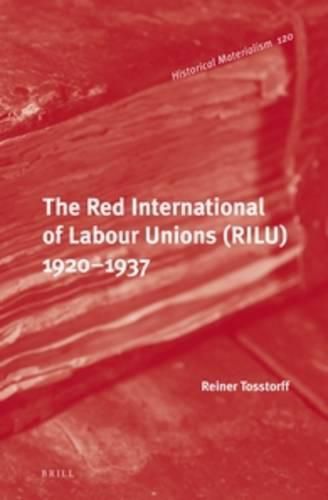Readings Newsletter
Become a Readings Member to make your shopping experience even easier.
Sign in or sign up for free!
You’re not far away from qualifying for FREE standard shipping within Australia
You’ve qualified for FREE standard shipping within Australia
The cart is loading…






The ‘Red International of Labour Unions’ (RILU, Russian abbreviation Profintern) was a central instrument for the spreading of international communism during the inter-war period. This comprehensive and scholarly history of the organisation, based on extensive research in the former communist archives in Moscow and East Berlin, sheds significant light on the international trade union movement of the period.
Tosstorff shows how the RILU began as a revolutionary alliance of syndicalists and communists in defiance of the social democratic International Federation of Trade Unions. His text presents a full account of the organisation’s main stages: the decline of the revolutionary wave after World War One, after which many syndicalists left, and others were integrated into the communist parties; the continuation of the RILU as an international communist apparatus; and its dissolution in 1936-7 as part of communism’s popular front policy.
First published in German as Profintern: Die Rote Gewerkschaftsinternationale 1920-1937 by Ferdinand Schoeningh, Paderborn, in 2004.
$9.00 standard shipping within Australia
FREE standard shipping within Australia for orders over $100.00
Express & International shipping calculated at checkout
The ‘Red International of Labour Unions’ (RILU, Russian abbreviation Profintern) was a central instrument for the spreading of international communism during the inter-war period. This comprehensive and scholarly history of the organisation, based on extensive research in the former communist archives in Moscow and East Berlin, sheds significant light on the international trade union movement of the period.
Tosstorff shows how the RILU began as a revolutionary alliance of syndicalists and communists in defiance of the social democratic International Federation of Trade Unions. His text presents a full account of the organisation’s main stages: the decline of the revolutionary wave after World War One, after which many syndicalists left, and others were integrated into the communist parties; the continuation of the RILU as an international communist apparatus; and its dissolution in 1936-7 as part of communism’s popular front policy.
First published in German as Profintern: Die Rote Gewerkschaftsinternationale 1920-1937 by Ferdinand Schoeningh, Paderborn, in 2004.